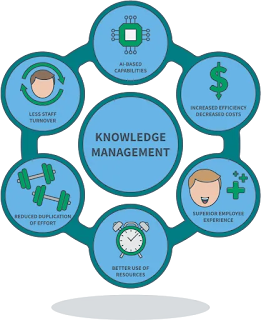Knowledge
management for an organization
INTRODUCTION:
Knowledge management is a broad process of identifying, managing, modifying and using information and expertise within an organization. The overall knowledge management process is supported by four key functions, such as leadership, culture, technology and measurement. Knowledge Management stores and shares knowledge, understanding and expertise gathered in an organization with its processes, methods and activities. It is an important source of knowledge. As Ulrich (1998: 126) has noted, knowledge has become a direct competitive advantage for firms that sell knowledge and ideas.
Knowledge management is of great concern to people and how they acquire, exchange and disseminate knowledge about information technology. It therefore becomes an important area for the HR practitioner who is in a strong position to influence this aspect of public management. It is linked to organizational learning.
Knowledge Management Definition:
Knowledge management is about gaining knowledge from those who need to increase the performance of the organization. Knowledge management strategies encourage people to share knowledge by connecting with people and sharing information so that they learn from documented experiences.
Knowledge Management Scarborough et al (1999) defined: 'To create knowledge, make, and capture, share and use, where, they propose organizational knowledge and processes as a result of organizational learning and the development of COL in organizations to improve the performance of any process. Knowledge management is concerned with the flow of both stocks and knowledge.
Picture 02, Benefits of knowledge Management
The objectives of knowledge management-
Key objectives of knowledge management are
01. Enhance / Improve Internal Cooperation between Employer and Employee and Improve Cooperation between Employees
02. Enhance / Improve External Support
03. Catch / record / share best practices
04. Improve customer relationships and its management
05. Create better project work-spaces and their management
06. Improving documents and protecting proprietary materials
07. A smooth transition from retirees to recruiting heirs to fill their posts
08. Reduce corporation memory loss and rest
09. Identify the most important source of knowledge and the most important fields, so that the organization
10. Develop a toolkit of methods that individuals, groups and organizations can use to mitigate the potential loss of capital
Key objectives of knowledge management are
01. Enhance / Improve Internal Cooperation between Employer and Employee and Improve Cooperation between Employees
02. Enhance / Improve External Support
03. Catch / record / share best practices
04. Improve customer relationships and its management
05. Create better project work-spaces and their management
06. Improving documents and protecting proprietary materials
07. A smooth transition from retirees to recruiting heirs to fill their posts
08. Reduce corporation memory loss and rest
09. Identify the most important source of knowledge and the most important fields, so that the organization
10. Develop a toolkit of methods that individuals, groups and organizations can use to mitigate the potential loss of capital
Knowledge
management strategies-
There are two strategies/ two approach have been identified by Hansen et al (1999): the codification strategy and the personalization strategy
There are two strategies/ two approach have been identified by Hansen et al (1999): the codification strategy and the personalization strategy
The Codification strategy:
‘Knowledge is carefully codified and stored in
database where it can be accessed and used easily by anyone in the
organization. Knowledge is explicit and its codified using a
‘people-to-document’ approach. This strategy is therefore document driven’
The Personalization strategy:
Knowledge is closely tied to the person who has
developed it and is shared mainly through direct person-to person contract.
This is a ‘person-to- person approach that involves ensuring that tacit
knowledge is passed on. The exchange is achieved by creating networks and
encouraging face-to-face communication between individual and terms by means of
informal conference, workshops, communities of practice, brainstorming and
one-to-one sessions
Conclusion-
Knowledge management is about gaining knowledge from those who need to increase the performance of the organization. Without a firm for knowledge management in an organization it can slow down the progress of the organization. So this concept is very important to improve the best work environment in the organization.
References-
Armstrong, M. and Stephen Taylor (2014) Armstrong
Handbook of Human Resource management practice, 13th edition
Boxall, P and Purcell, J (2000) strategic human
resource management
Mecklenberg, S, Deering, A and Sharp, D (1999)
Knowledge management


Clearly explained how organizational development is built through knowledge management.well done.
ReplyDeleteGood article
ReplyDeletePutting in place a good KM Strategy is crucial to be able to turn your enterprise information into Enterprise Knowledge.
ReplyDeleteThank you for the comment
DeleteI see a clear explanation of knowledge management aspect in HRM in this article. It’s manipulation to thrive in the face of challenge of globalization has to perceived in your industrial context.
ReplyDeleteWell explained
ReplyDeleteKnowledge management is concerned with the process of making, obtaining, sharing and keeping up information that's essential to the organization
ReplyDeleteThank you for the comment
Delete